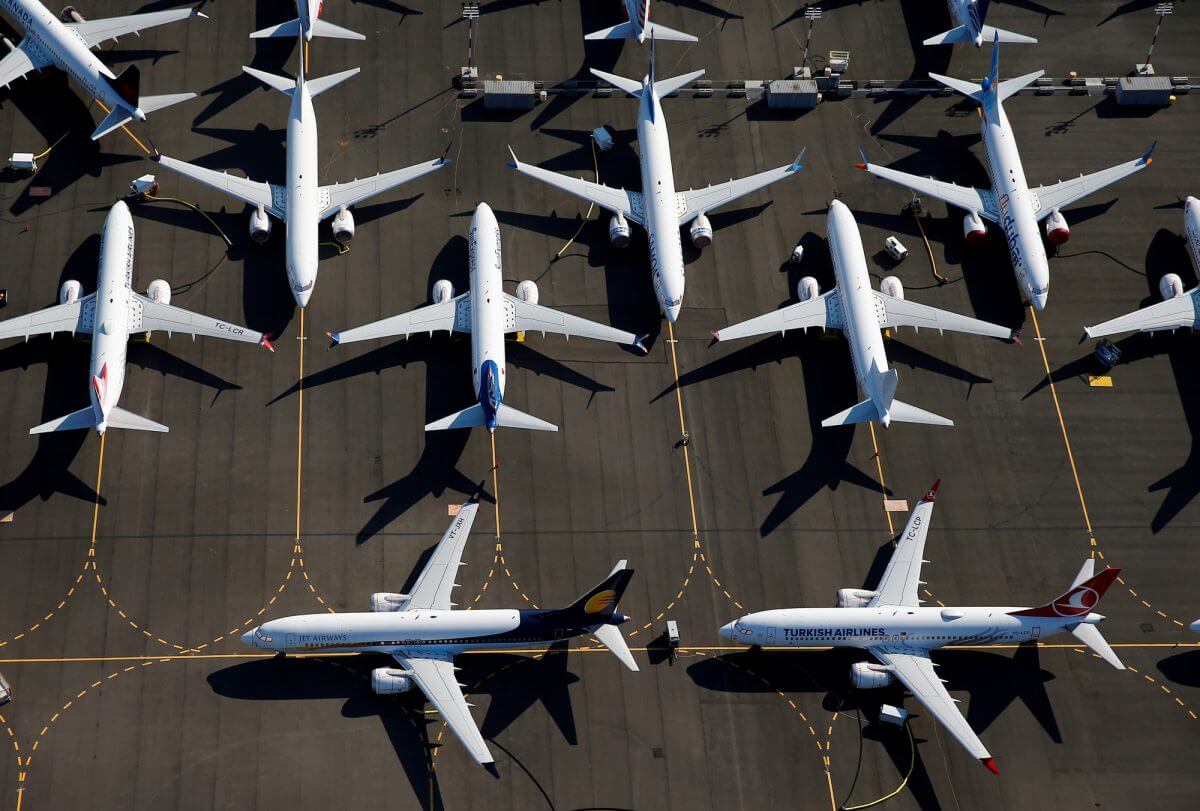
European lawmakers are pressuring Boeing to fix the internal wiring of the MAX 737 fleet. The request comes at an interesting time in frayed U.S.-European trade relations. | Image: Lindsey Wasson / File Photo
- European regulators are calling for Boeing to move important wiring in the 737 MAX.
- The FAA believes the wires are fine where they are.
- Boeing is America’s biggest exporter and delays in the 737 MAX un-grounding give European lawmakers leverage over Trump.
While attention has been focused on the trade war between the United States and China, the trade dispute between America and Europe is heating up. Lawmakers and regulators may be engaging in a tit for tat as the deadline for Trump’s European trade agreement looms.
Boeing appears to be the latest victim in the trade squabble. European regulators are asking the American plane manufacturer to re-locate certain electrical wiring in the Boeing 737 MAX – a move the FAA believes is unnecessary. If regulators force Boeing to change wiring in the 737 MAX, they could delay the plane’s un-grounding by months. This gives European lawmakers leverage over the U.S. Airbus, Boeing’s European rival, also stands to benefit.
Boeing’s new 777X. | Image: Jason Redmond / AFP
Boeing 737 MAX Grounding is Costing the U.S Economy Billions
The 737 MAX grounding costs the United States billions of dollars through delayed flights and lost revenue throughout the plane’s extensive supply chain. [Financial Times] No one is feeling the pain worse than America’s domestic carriers. American Airlines (NASDAQ:AAL) and Southwest Airlines (NYSE:LUV) are expected to pay a $1 billion price tag between them. [CNN]
To ease industry concerns, Steve Dickson, head of the Federal Aviation Administration, spoke to senior officials at America’s biggest carriers. He suggested that Boeing was progressing towards fixing the major problems with the 737 MAX. The industry took this to mean the planes would be back in the air before midyear. [Reuters]
Dickson stated the following:
While the FAA continues to follow a thorough, deliberate process, the agency is pleased with Boeing’s progress in recent weeks toward achieving key milestones. Safety is the top priority, and the FAA continues to work with other safety regulators to ensure that Boeing has addressed all known issues with the aircraft.
But It looks like the ‘other regulators’ disagree with the FAA about the Boeing 737 MAX’s issues. Recent reports from the FAA’s counterparts in Europe may throw a monkey wrench in Dickson’s plans to get the plane back in the air by mid year.
European Regulators Clash with FAA over 737 MAX Wiring
According to The Wall Street Journal, which cites individuals familiar with the matter, experts at the European Union Aviation Safety Agency (EASA) take issue with the location of potentially dangerous wiring in the Boeing 737 MAX. They want Boeing to move these wires to reduce the likelihood of short circuits that could theoretically disrupt the plane’s flight control systems. The FAA disagrees with the EASA’s assessment and believes the wiring is fine where it is.
European regulators had initially been expected to approve the Boeing 737 MAX in January. [Reuters] But these issues give observers a better idea of why the process is moving much slower than expected.
Is This Part of a Wider Trade Dispute Between the U.S and Europe?
The new Boeing 737 MAX issues come at an interesting time.
U.S. and European trade relations are already tense as Trump has been threatening to tariff European automakers. [Bloomberg] By delaying the Boeing 737 MAX approval, European regulators can essentially block America’s biggest exporter from accessing the crucial European market. This gives the Europeans much more leverage when negotiating with Trump.
Shares in Airbus, Boeing’s European rival, have risen around 17% since the Boeing 737 MAX was grounded in March 2019.
Airbus is currently winning the bitter rivalry. | source: ycharts.com
Disclaimer: The opinions expressed in this article do not necessarily reflect the views of CCN.com.
This article was edited by Sam Bourgi.
Last modified: February 3, 2020 7:47 PM UTC






